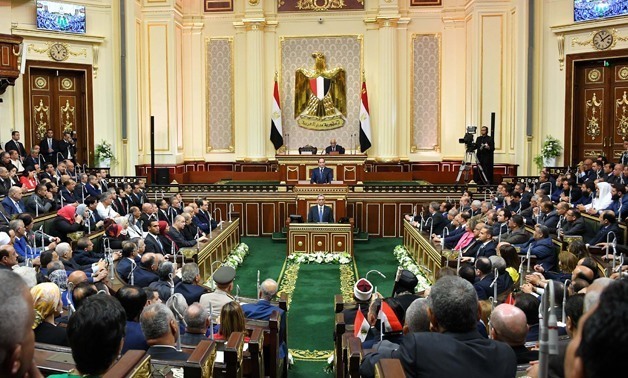
President Sisi gives a speech at the House of Representatives on Saturday, June 2, 2018, after swearing in for a second term in presidency - Press photo
CAIRO – 13 December 2018: First Deputy Speaker of Egypt's Parliament Al-Sayed al-Sherif reviewed in a meeting a number of articles of the draft law regulating medical and clinical research which President Abdel Fatah al-Sisi objected to.
This came during the first meeting of a special parliamentary committee that was formed to re-study the draft law, which was referred to the Parliament after Sisi objected to some articles.
Sherif said the president’s objections indicate that the punitive provisions of the draft law have been too harsh, which could cause a state of terror and fear among researchers, explaining that the project prohibited sending human samples for research abroad.
President Sisi objected to some articles of the draft law regulating medical and clinical research, calling the Parliament to reconsider them, Parliament Speaker Ali Abdel Aal announced on October 2 during the fourth round’s plenary session.
Sisi referred in his letter to the Parliament that the draft law is important and dangerous, as it is related to the protection of the constitution, the sanctity of the human body, and the freedom of scientific research.
In this regard, he referred to Article 60 of the Egyptian Constitution reading “the sanctity of the human body is inviolable,and assaulting or defaming it is a crime that shall be punished by law. Human body shall not be subjected to any medical and scientific experiment.”
The Egyptian president returned the draft law to the Parliament to be reconsidered, opposing the draft law’s Articles 4, 5, 9, 11, 19, 20 and 22, which refer that all researchers and scientists should seek the prior approval of the Higher Council of Medical Research ahead of conducting any medical or clinical experiments and tests.
“The researches include masters, doctorate, free and funded researches in the Faculty of Medicine. That means it is impossible to follow up these huge numbers of researches, carried out every month, only by committees in every research entity.”
Sisi also opposed the small number of representatives of Egyptian faculties and institutes in the Supreme Council, which reaches only 4 out of 15 members as 97 percent of researches are carried out inside faculties and institutes.
Sisi further rejected the draft law’s punitive articles as “they do not take into account the nature of scientific research and consider that the irregularities are the same in all types of research.”
Moreover, the draft law stipulates that sending human samples abroad shall be punished by a prison sentence.
In this regard, President Sisi said that sending the samples abroad will allow examining them with modern equipment, which may not be locally available; hence, the draft law will require issuing reports on specialists’ work free of charge, costing the state a lot of money and affecting the quality and expansion of scientific research in Egypt.
Sherif subsequently said that the General Committee will listen to the concerned entities, including the Ministry of Higher Education and the Supreme Council of Universities, in addition to senior experts and scientists as well as the heads of the education and scientific research and health affairs committees.
Mohamed al-Amari, head of the Parliament’s Health Affairs Committee, remarked that the General Committee will form a specialized committee to redraft the articles of the draft law.


Comments
Leave a Comment